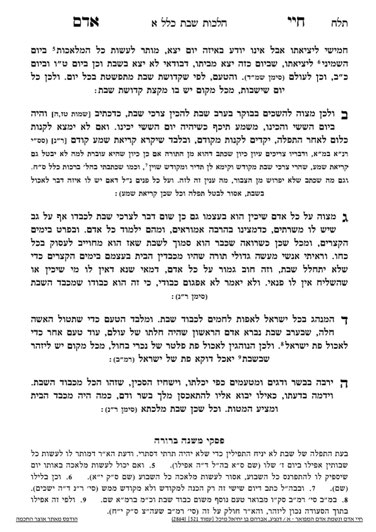We are beginning siman 5. The Chayei Adam writes that a person should give kavod to Shabbos, and have oneg on Shabbos, by having a nice, plentiful seudah. They should include meat, fish and other good tasting food, depending on a person’s financial ability. The Chayei Adam mentions meat, but we need to determine whether there is an actual chiyuv to have meat on Shabbos.
In siman 250:2, the Shulchan Aruch writes that one should increase their meat, fish and other good tasting foods, depending on their financial ability. This language is almost identical to that of the Chayei Adam and is taken from the Rambam. The Mishnah Berurah, in siman 552, explains that there is no chiyuv to eat meat on Shabbos. However, there is a chiyuv of oneg on Shabbos, so if one enjoys meat, it would be an appropriate way to express their oneg Shabbos. This is different from Yom Tov, where there is a mitzvah of simcha, and the Gemara tells us that the mitzvah of simcha is expressed through meat. On Shabbos, there is no mitzvah of simcha, but rather the mitzvos of kavod and oneg, as we have been discussing.
It is interesting that the Chayei Adam does not mention wine at all regarding Shabbos, while the Shulchan Aruch does. The Piskei Teshuvos brings (250:50) from the Mishnah Berurah that nowadays, it is no longer standard to have wine with a meal. Therefore, as long as one has a pleasurable drink, they have fulfilled their chiyuv (i.e., the mitzvah of oneg), and there is no unique chiyuv to have wine.
The Chayei Adam mentions fish. He is based on the Gemara which says a person demonstrates oneg Shabbos by having a certain type of fish. The poskim assume that the Gemara is limited to those days, where that type of fish was a way of showing the significance and chashivus to their meal. Nowadays, a person fulfills oneg Shabbos through whatever dish gives them pleasure.
Kabbalistically, there is a special idea of having fish on Shabbos. Fish are unique in that the process of making them permitted for consumption does not require shechita. Kabbalistically, the process of shechita indicates that something (the lower nefesh found in the blood) needs to be removed from the animal in order for it to be consumed. Fish do not require this process, which indicates they are on a higher spiritual level. Therefore, it is appropriate to eat fish on Shabbos. However, it is clear that although this is a kabbalistic approach, it is not a halachic requirement.
The Chayei Adam is teaching us that one should try to make the experience of eating food on Shabbos as pleasurable as possible, in order to fulfill the mitzvah of oneg.
The Chayei Adam continues, and writes that one should sharpen their knives as a kavod for Shabbos. Mrs. Reingold quotes her mother, a”h, who would say that the reason one must sharpen their knives is because if the knife is not sharp, when the challah is cut, it will end up getting smushed, and the woman who baked them will get upset that her beautiful challahs got smushed. This ends up undermining the shalom bayis in the house. This is actually the language of the Mishnah Berurah, who says that if the knives are not sharp, it may lead to arguments. If the knives do not cut easily, it will be harder to eat, which could lead to people being grouchy and getting into arguments. We want people to be able to receive as much benefit and oneg as possible.
The Chayei Adam continues, and writes that one must develop the attitude in their minds that if a king of flesh and blood were visiting for the weekend, they would certainly have the house thoroughly cleaned and with presentable food. How much more so one must prepare the special guest known as Shabbos Kodesh.
Summary
There is a mitzvah of oneg Shabbos, which is fulfilled by consuming foods and drinks that bring a person delight. There is no chiyuv to consume any specific foods, but rather whichever foods bring a person oneg.
There is a kabbalistic custom to eat fish on Shabbos.
One should sharpen their knives for Shabbos.



